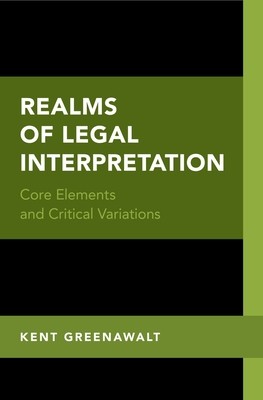
- We will send in 10–14 business days.
- Author: Kent Greenawalt
- Publisher: Oxford University Press, USA
- ISBN-10: 0190882867
- ISBN-13: 9780190882860
- Format: 15.5 x 23.6 x 2.3 cm, hardcover
- Language: English
- SAVE -10% with code: EXTRA
Reviews
Description
Legal norms may forbid, require, or authorize a particular form of behavior. The law of contracts, for example, informs people how to enter into agreements that will bind both sides, and from this we establish legal requirements on how they should behave. In public law, legal standards provide authority to legislators and executive officials to set standards for citizens, and also give judges the authority to decide disputes by applying and interpreting governing standards.
In Realms of Legal Interpretation, Kent Greenawalt focuses on how courts decide what is legally forbidden or authorized, and how context shapes their decisions. The problem, he argues, is that we do not, and never have, agreed exist on all the details of the standards United States judges should employ--like everyone else, judges have different ideas of what constitutes good common sense. Moreover, circumstance regularly throws up hurdles. For instance, what should a judge do if the text of a statute does not fit the intention of the legislators, or if someone has obviously and mistakenly omitted a necessary item from a will or contract? Different judges react in different ways. Acknowledging that courts will never agree upon a uniform approach to applying norms and interpreting the law, Greenawalt's aim is to provide a capacious, user-friendly model for approaching hard cases sensibly in both public and private law. Just as importantly, the book serves as a pithy guide to the majorforms of legal interpretation for nonlawyers. Ultimately, Realms of Legal Interpretation represents a pithy distillation of Greenawalt's many works on the theories that anchor legal interpretation in America's legal system.
EXTRA 10 % discount with code: EXTRA
The promotion ends in 20d.06:22:41
The discount code is valid when purchasing from 10 €. Discounts do not stack.
- Author: Kent Greenawalt
- Publisher: Oxford University Press, USA
- ISBN-10: 0190882867
- ISBN-13: 9780190882860
- Format: 15.5 x 23.6 x 2.3 cm, hardcover
- Language: English English
Legal norms may forbid, require, or authorize a particular form of behavior. The law of contracts, for example, informs people how to enter into agreements that will bind both sides, and from this we establish legal requirements on how they should behave. In public law, legal standards provide authority to legislators and executive officials to set standards for citizens, and also give judges the authority to decide disputes by applying and interpreting governing standards.
In Realms of Legal Interpretation, Kent Greenawalt focuses on how courts decide what is legally forbidden or authorized, and how context shapes their decisions. The problem, he argues, is that we do not, and never have, agreed exist on all the details of the standards United States judges should employ--like everyone else, judges have different ideas of what constitutes good common sense. Moreover, circumstance regularly throws up hurdles. For instance, what should a judge do if the text of a statute does not fit the intention of the legislators, or if someone has obviously and mistakenly omitted a necessary item from a will or contract? Different judges react in different ways. Acknowledging that courts will never agree upon a uniform approach to applying norms and interpreting the law, Greenawalt's aim is to provide a capacious, user-friendly model for approaching hard cases sensibly in both public and private law. Just as importantly, the book serves as a pithy guide to the majorforms of legal interpretation for nonlawyers. Ultimately, Realms of Legal Interpretation represents a pithy distillation of Greenawalt's many works on the theories that anchor legal interpretation in America's legal system.


Reviews